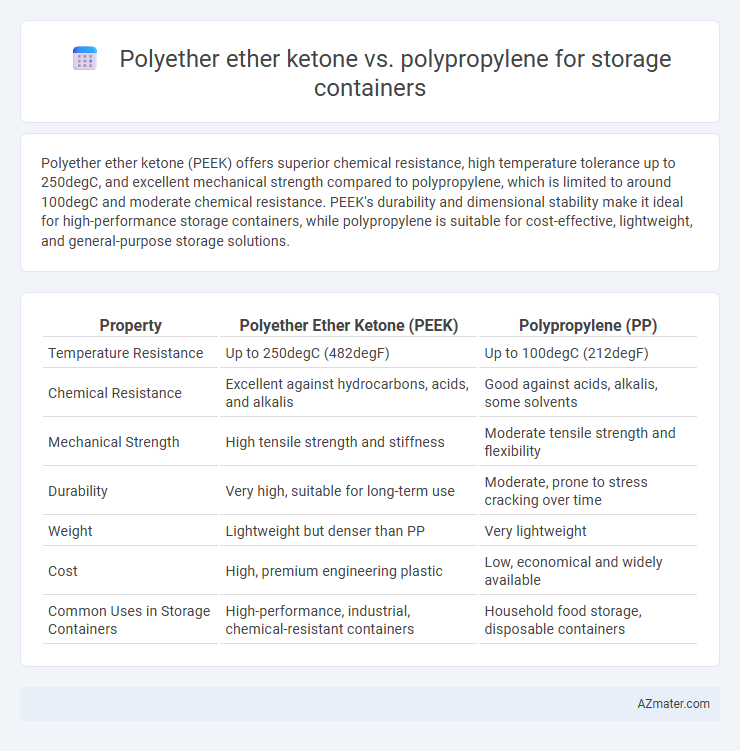Polyether ether ketone (PEEK) offers superior chemical resistance, high temperature tolerance up to 250degC, and excellent mechanical strength compared to polypropylene, which is limited to around 100degC and moderate chemical resistance. PEEK's durability and dimensional stability make it ideal for high-performance storage containers, while polypropylene is suitable for cost-effective, lightweight, and general-purpose storage solutions.
Table of Comparison
| Property | Polyether Ether Ketone (PEEK) | Polypropylene (PP) |
|---|---|---|
| Temperature Resistance | Up to 250degC (482degF) | Up to 100degC (212degF) |
| Chemical Resistance | Excellent against hydrocarbons, acids, and alkalis | Good against acids, alkalis, some solvents |
| Mechanical Strength | High tensile strength and stiffness | Moderate tensile strength and flexibility |
| Durability | Very high, suitable for long-term use | Moderate, prone to stress cracking over time |
| Weight | Lightweight but denser than PP | Very lightweight |
| Cost | High, premium engineering plastic | Low, economical and widely available |
| Common Uses in Storage Containers | High-performance, industrial, chemical-resistant containers | Household food storage, disposable containers |
Introduction to Storage Container Materials
Polyether ether ketone (PEEK) offers exceptional mechanical strength, chemical resistance, and thermal stability, making it ideal for high-performance storage containers in demanding environments. Polypropylene (PP) provides cost-effective, lightweight, and chemical-resistant properties suited for general-purpose storage applications with moderate temperature requirements. Selecting between PEEK and PP depends on specific use cases, balancing factors such as durability, temperature tolerance, and budget constraints.
Overview of Polyether Ether Ketone (PEEK)
Polyether Ether Ketone (PEEK) is a high-performance engineering thermoplastic known for its exceptional chemical resistance, thermal stability up to 250degC, and mechanical strength, making it ideal for demanding storage container applications. Unlike polypropylene, PEEK offers superior resistance to harsh solvents, high impact strength, and excellent dimensional stability under long-term load. These properties enable PEEK containers to maintain integrity in extreme environments where longevity and durability are critical.
Overview of Polypropylene (PP)
Polypropylene (PP) is a versatile thermoplastic polymer widely used for storage containers due to its excellent chemical resistance, durability, and lightweight properties. It offers high impact strength and is resistant to moisture, making it ideal for both food storage and industrial applications. Compared to Polyether ether ketone (PEEK), PP is more cost-effective but has lower thermal resistance and mechanical strength.
Key Physical Properties Comparison
Polyether ether ketone (PEEK) offers superior mechanical strength, high chemical resistance, and excellent thermal stability up to 250degC, making it ideal for demanding storage container applications. Polypropylene (PP) provides good chemical resistance and impact strength but has a lower melting point around 160degC and less rigidity compared to PEEK. The higher tensile strength and dimensional stability of PEEK enable longer-term durability and performance in harsh environments, whereas polypropylene is more cost-effective for less critical storage needs.
Chemical Resistance and Durability
Polyether ether ketone (PEEK) offers superior chemical resistance compared to polypropylene, withstanding harsh solvents, acids, and high temperatures without degradation, making it ideal for industrial storage containers. PEEK exhibits outstanding durability with high tensile strength, wear resistance, and long-term thermal stability, ensuring longevity even in demanding environments. In contrast, polypropylene is more prone to chemical attack from strong oxidizers and has lower mechanical strength, limiting its use in aggressive or high-stress storage applications.
Temperature Tolerance and Stability
Polyether ether ketone (PEEK) exhibits superior temperature tolerance, maintaining structural integrity up to 250degC, whereas polypropylene (PP) typically withstands temperatures only up to 100degC. PEEK's exceptional thermal stability and resistance to chemical degradation make it ideal for high-temperature storage applications, contrasting with polypropylene's lower heat resistance and tendency to deform under prolonged heat exposure. For industries requiring durability in elevated temperature environments, PEEK offers significantly enhanced performance compared to polypropylene containers.
Safety and Food Compatibility
Polyether ether ketone (PEEK) offers superior chemical resistance and thermal stability compared to polypropylene (PP), making it highly suitable for long-term food storage where safety is critical. PEEK's inert nature prevents leaching of harmful substances into food, ensuring compliance with stringent food contact safety standards, unlike polypropylene which may degrade under high temperatures and potentially release additives. The enhanced mechanical strength and resistance to wear and sterilization processes of PEEK provide a durable, food-safe option for storage containers requiring repeated cleaning and hygienic conditions.
Cost Analysis and Economic Feasibility
Polyether ether ketone (PEEK) exhibits superior mechanical strength and chemical resistance compared to polypropylene, but its high production cost significantly increases the initial investment for storage containers. Polypropylene offers a cost-effective solution with lower raw material and manufacturing expenses, making it economically feasible for large-scale, non-critical storage applications. Choosing between PEEK and polypropylene depends on balancing the budget constraints with performance requirements, as PEEK's long-term durability can offset higher upfront costs in demanding environments.
Environmental Impact and Recyclability
Polyether ether ketone (PEEK) offers superior chemical resistance and durability, greatly extending the lifespan of storage containers and reducing waste over time compared to polypropylene (PP). Polypropylene is more widely recyclable through common municipal programs, making it a more accessible option for reducing environmental impact in single-use or short-term containers. The production of PEEK involves higher energy consumption and carbon emissions, while polypropylene's lower production footprint and easier recyclability contribute to a smaller overall environmental impact.
Conclusion: Choosing the Right Material
Polyether ether ketone (PEEK) offers superior chemical resistance, high temperature tolerance up to 250degC, and exceptional mechanical strength, making it ideal for high-performance storage containers in harsh environments. Polypropylene (PP) provides excellent cost-effectiveness, good chemical resistance to acids and bases, and flexibility suitable for everyday storage needs at lower temperatures around 100degC. Choosing the right material depends on specific application requirements: opt for PEEK in demanding industrial or medical storage scenarios, while polypropylene is suitable for general-purpose applications with moderate temperature and chemical exposure.

Infographic: Polyether ether ketone vs Polypropylene for Storage container
 azmater.com
azmater.com